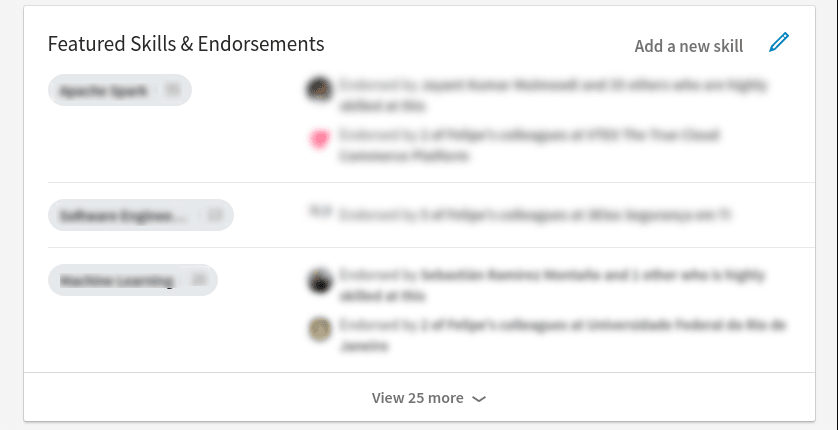Suggestions on how to make LinkedIn more relevant
Last updated:
I use LinkedIn a lot; I think it's a good place to invest in.
Most of the employment opportunities usually come from LinkedIn these days.
I see LinkedIn as:
A Social network for professionals (contacts, followers, chatting, groups, etc)
A peer-to-peer professional rating system (usgin metrics such as endorsements and testimonials)
My general feeling is that LinkedIn as a social network is OK but as a rating system it's easy to game.
Metrics need to keep changing to avoid being "gamed"
Metrics are used to measure things other than themselves, things that often cannot be measured directly. Some examples of metrics are: GDP, GPA, IQ, etc:
GDP is a measure of a country's wealth, which cannot be calculated directly.
GPA is a measure of how much someone has learned while at university/college, which cannot be calculated directly.
IQ is a measure of somebody's general intelligence, which also cannot be measured directly.
However, since most people use these metrics in place of the things they apporoximate, there exists an incentive to try to optimitize only the metric, in detriment to the underlying concept, for example:
Governments can increase their GDP by causing inflation, but that doesn't mean the country got richer.
People cheat at exams to optimize their GPA, but that doesn't mean they learned more because of this.
People cheat at IQ tests to raise their points, but that doesn't mean they are more intelligent.
These are all ways in which metrics can be gamed.
In other words, there are ways to artificially increase the metric while not increasing the underlying factors it's supposed to be measuring.
As a social network, LinkedIn is OK
It's a nice place to present your professional face to your peers, i.e. you can keep Facebook for more relaxed interactions and LinkedIn for investing in your pesronal brand, professional contacts and more formal conversations.
But keep in mind that he number of contacts you have means almost nothing, since there is an incentive to add as much people as you can (even people you don't know) to reach Influencer status.
LinkedIn endorsements can be (and are) gamed
 Your LinkedIn contacts can endorse you for skills. (Image from 2017)
Your LinkedIn contacts can endorse you for skills. (Image from 2017)
Endorsement gaming introduces noise into the system and reduces its effectiveness.
You can artificially inflate your endorsements by endorsing people you don't know, for skills you know nothing about, and ask them to endorse you back.
Folks at LinkedIn have probably noticed this too. They have recently added some features related to that:
Endorsements from people in the same company/university, etc are highlighted.
Endorsements from people who, themselves, have large endorsements for that skill are also highlighted.
These are steps in the right direction but they don't solve the problem, in my opinion.
How to prevent that
The main problem is with endorsements.
Skill Endorsements must be somehow normalized to reflect how relevant they are
For example: an endorsement from someone who only rarely endorses someone must count much more than an endorsement from someone who endorses everyone they are connected with.
This reduces the incentive for people to give out random endorsements (as it will proportionally reduce the individual impact each of their endorsements has)
Mutual endorsements/testimonials must have less weight
- This reduces the incentive for people trading endorsements (I endorse you and you endorse me, kind of thing)
Professional Recommendations
This is when somebody writes about you, in full text:
 Text recommendations are much more valuable than skill endorsements. (Image from 2017)
Text recommendations are much more valuable than skill endorsements. (Image from 2017)
These are obviously much more valuable than skill endorsements because:
Writing simply takes more time than just clicking a skill you want to endorse someone for. This means you will do it for a much smaller set of people.
It puts your (the writer's) neck on the line. You expose yourself (your name and relationship with the recipient) and, for this reason, it's much more risky (therefore less likely) for you to write something you are not 100% sure about.
Conclusion
LinkedIn can become the professional rating system. In my opinion, this can be even more valuable than a regular social network.
Right now, there are incentives to game the system because of the way it's built, but it can be improved, by reducing the incentives one has to game the system.